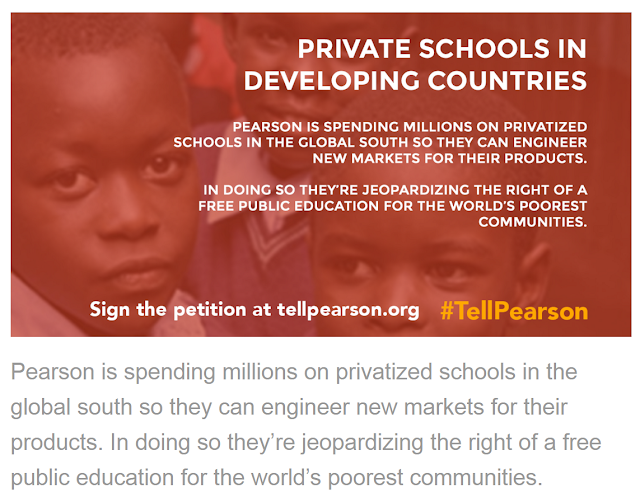A public education system in decline, a government that is more than willing to lift restrictions just to entice privatization of education, and a globalized economy that now can easily dictate what wages should be and not ought to be can easily combine to form a destructive corporatization of basic education. Learning outcomes in basic education are closely tied to the quality of life of children both inside and outside schools. This is a fact strongly supported by research. No corporation therefore can claim any ability to turn around failing schools in poor communities or developing countries without improving first the lives of the children in these depressed neighborhoods.
Randi Weingarten, president of the American Federation of Teachers is attending a shareholders' meeting in London. The company is Pearson. In an email circulated by an action network, Weingarten describes Pearson in the following manner:
Pearson’s brand is becoming toxic because it promotes bad policy that puts profit over what’s good for students. But its model is so broken that its stock price is down more than 40 percent in the last year, making Pearson a bad bet for investors and public schools.
In the United States, parents and students are opting out of Pearson’s high-stakes tests and telling governments to end contracts with Pearson. Pearson puts “gag clauses” in test contracts to prevent teachers from raising questions about the tests, and has been caught monitoring kids’ social media to stop testing leaks.
In the developing world, Pearson is charging poor parents up to half their income to send a single child to school and spending millions to expand its markets.
That model is broken, and the company isn’t returning good value for shareholders or helping improve public education.
Links to various calls for action are also included in the email and the following specifically addresses a growing concern in developing countries:
 |
| Pearson's stock price in the last year, copied from Yahoo Finance |
The situation in the Philippines is indeed ripe for privatization of schools. With a new curriculum that the government obviously cannot implement, there is a strong momentum toward engaging the private sector into basic education. The voucher program alone provides a strong incentive for entrepreneurs to take advantage of the situation.
Of course, this is really not
news. A lot of people are simply not paying attention. A
previous post in this blog months ago highlighted an article in the
Huffington Post by Alan Singer.
Singer basically digested a study made by
Curtis Riep. The study exposed a partnership between Pearson and the Ayala group. Riep concluded that such a partnership was not good for Philippine basic education.
Big business has moved into the education sector because they
are motivated by the view that the quality of education in the
Philippines is in decline, we’re lagging behind, and we’re no
longer competitive in the global market. Business can’t wait
for government to fix the situation so they’ll invest and do it
themselves. So the key motivation is global competitiveness. The
kind of education they are pushing for is one that will develop
the skills for the global labour market. So, the impact of the
corporatisation of education here in the Philippines is supposedly
to strengthen ties with the global labour market. Will this lead to
genuine development for the majority of Filipinos? We think not.
Filipinos will not lift themselves out of poverty by exporting our
labour or educating our students so they can become low-paid,
low-skilled workers for foreign companies.
Weingarten's email, however, adds a far more bitter layer to this story. Pearson, like any corporation, is looking for profits. Profit is the difference between the costs of production and the price consumers pay. One maximizes profits by either lowering the cost of production or charging the consumer a higher price. By relaxing requirements for the delivery of basic education, corporations can hire teachers that are not licensed. These teachers, of course, cannot demand just wages. Schools need not meet basic requirements of having a science laboratory or a place for exercise, recess and physical education. On the other hand, subsidies like the voucher program ensures the corporation of revenue.
This blog, for the past four years, has been outlining the challenges basic education faces as well as possible solutions to address problems. Clearly, there is no way corporate greed could be beneficial to public basic education. Corporate greed can only destroy public basic education.




Comments
Post a Comment